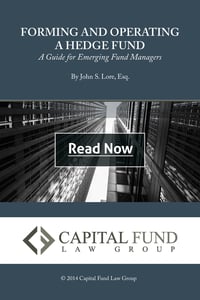Mark-to-Market Election for Hedge Funds
Section 475 of the tax code permits certain active traders to treat all investment transactions as generating ordinary income or loss. Fund managers making a mark-to-market election recognize all gain or loss in open positions at year-end at the current fair market value as though they had been sold on December 31. By recognizing all transactions as ordinary income a fund manager forfeits the ability to treat any assets as long-term capital gains. Similarly, by marking portfolio assets to market at year-end, a manager loses the ability to defer income to later years.
Why Would a Hedge Fund Want to Make a 475 Election?
At initial glance, a hedge fund manager's decision to do a mark-to-market election would seem unlikely. However, to a fund manager with an investment strategy centered on high-trade-frequency, the 475 election can offer substantial tax advantages and can streamline accounting.
Offset Gains against Losses in Subsequent Years
Under a mark-to-market election, taxpayers can offset gains in prior years against losses in subsequent years. In contrast, fund managers not making the mark-to-market election may only offset a maximum of $3,000 per year from prior tax years (pursuant to Section 1211 of the tax code).
Wash-Sale Rules Removed
Another benefit of a 475 election is the removal of the burdensome requirements of wash-sale rules. A wash sale is the sale of a security at a loss and a subsequent repurchase of the same or substantially identical security shortly before or after the election. Wash-sell rules require careful accounting and can be burdensome to high frequency trading. A fund manager is freed from wash-sale accounting obligations after filing a mark-to-market election.
-
-
Other Advantages of Mark-to-Market Accounting
-
There are other advantages of mark-to-market election, which are beyond the scope of this article but are highlighted below:
- mark-to-market transaction income is not subject self-employment.
- Loss disallowance rules for related party transactions under Sections 267 and 707(b) are inapplicable
- No requirement to track historical cost basis, since the investment asset has a new basis each year
- Section 263A and 263(g) uniform capitalization rules and interest expense are removed.
- Constructive sales rules from Section 1259 are inapplicable.
Who Can Qualify for the Election?
In determining tax qualification, the tax code has separate rules for investors in securities and commodities. For reasons beyond the scope of this article, commodities funds rarely find it advantageous to make a mark-to-market election and accordingly, this article will focus only on securities instruments. Please call our firm with specific questions about whether to make a mark-to-market election as a managed futures fund.
Only taxpayers that are deemed to be “traders” are permitted to make a mark-to-market election. To be considered a “trader,” in contrast to an “investor,” a taxpayer must engage in a strategy employing a very high frequency of trading. The standard for determining whether a taxpayer is a “trader” or “investor” is set forth in Chen, T.C. Memo. 2004-132. In that case the Tax Court stated that to be considered a “trader” a taxpayer must meet the following two-prong test: (1) The taxpayer’s strategy must have an aim to “catch the swings in the daily market movements”; and (2) the trading must be “frequent, regular, and continuous.” Subsequent court cases have further clarified that the trading activity must be full time and continue throughout the entire year.
How to Make the Election?
A mark-to-market election requires a written statement with the following information
According to IRS instructions http://www.irs.gov/taxtopics/tc429.html, the statement should include the following information:
- “That you are making an election under section 475(f);
- The first tax year for which the election is effective; and
- The trade or business for which you are making the election.”
The fund must file the statement by the original federal income tax due date (regardless of extensions) of the year immediately preceding the tax election year.
Additionally, the election statement must be attached either to the return, or the extension request.
Is the Election Permanent
Once made, the mark-to-market method must be used for all future years. The only way to change the election is with the consent of the IRS, which is very difficult to obtain. Hedge fund managers should carefully weigh the pros and cons of an election, and be sure that it will qualify for an election before proceeding with this important decision.
INSTRUCTIVE RESOURCES
Capital Fund Law Group has authored numerous investment fund publications, including instructive eBooks, white papers, blog posts, and sample offering document excerpts with illustrative footnotes. These complimentary downloads are dedicated to helping fund managers understand the legal fundamentals of launching and operating an investment fund.





